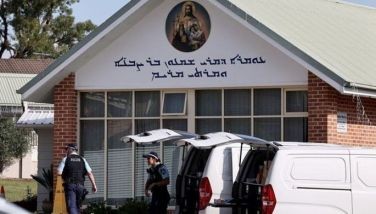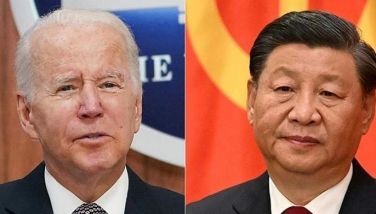Myanmar hit by fresh round of sectarian violence
THANDWE — Buddhist mobs killed a 94-year-old Muslim woman and torched more than 70 homes on yesterday as sectarian violence again gripped Myanmar's Rakhine state despite a visit by President Thein Sein, officials and residents said.
With attacks reported in several villages on the outskirts of Thandwe, where tensions have been mounting for days, the number of causalities could rise.
More than 700 rioters, some swinging swords, took to the streets in Thabyuchaing, about 20 kilometers (12 miles) north of the coastal town, on yesterday afternoon, police officer Kyaw Naing said.
An elderly Muslim woman died from stab wounds in the clashes that followed, the officer said, putting the number of houses set on fire at between 70 and 80.
Smoldering buildings — and several injured Buddhist Rakhines — were seen by The Associated Press in Shwe Hlay. A police officer, speaking on condition of anonymity because he did not have authority to talk to the media, said Linthi also was hit by rioters.
Both villages are about 17 kilometers (10 miles) from Thandwe.
The visit by Preisdent Thein Sein to the divided region was his first since sectarian violence broke out more than a year ago.
He arrived in the Rakhine state capital of Sittwe under tight security early yesterday and was scheduled to travel to several more towns, including Maungdaw to the north and, on Wednesday, Thandwe to the south, said a senior official in the president's office, declining to be identified because he was not authorized to speak about the sensitive trip.
He said Thein Sein "is going there to help find a long-term solution to the problem" and would meet with government officials and residents.
A heavy security presence failed to deter the attackers, however, with witnesses saying soldiers and police made no efforts to step in. A 6 p.m. curfew was imposed.
Sectarian clashes that began in Rakhine in June 2012 have since morphed into an anti-Muslim campaign that has spread to towns and villages nationwide. So far, more than 240 people have been killed and more than 140,000 have fled their homes, the vast majority of them Muslims.
Thein Sein, who has been praised for making moves to transition from half a century of harsh military rule, has been criticized for failing to contain the unrest and protect the country's embattled Muslim minority.
Many of those targeted so far have been ethnic Rohingya Muslims, considered by many in the country to be illegal migrants from Bangladesh, though many of their families arrived generations ago.
But in the latest flare-up, the victims were Kamans, another Muslim minority group, whose citizenship is recognized.
The trouble started Saturday, when a Buddhist taxi driver alleged he'd been verbally abused by a Muslim shop owner while trying to park his vehicle.
Hours later, rocks were thrown at the man's home. And by Sunday, as anger spread, two houses owned by Muslims were burned to the ground.
The violence has proven to be a major challenge for Thein Sein's government, which rights groups say has done little to crack down on religious intolerance and failed to bridge a divide that has left hundreds of thousands of Muslims marginalized, many of them trapped in prison-like camps for those who have been displaced.
Initially confined to Rakhine state, sectarian attacks have spread this year into Myanmar's heartland, ravaging several other cities across the country. At the same time, a Buddhist-led campaign called "969" has taken root nationwide. Its supporters urge Buddhists to shop only at Buddhist stores and avoid marrying, hiring or selling their homes or land to Muslims.
While radical monks have helped fuel the crisis, saying Muslims pose a threat to Buddhist culture and traditions, critics say a failure by the government and society as a whole to speak out is helping perpetuate the violence.
"Political, religious and community leaders need to condemn hate speech," Jim Della-Giacoma of the International Crisis Group said in a statement.
"Those who are spreading messages of intolerance and hatred must not go unchallenged. Otherwise, this issue could come to define the new Myanmar, tarnishing its international image and threatening the success of its transition away from decades of authoritarianism," he said.
Muslims, who account for about 4 percent of Myanmar's roughly 60 million people, have been the main victims of the violence since it began. But most criminal trials have involved prosecutions of Muslims rather than members of the Buddhist majority.
- Latest
- Trending



























